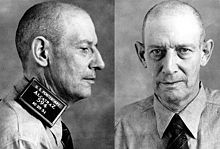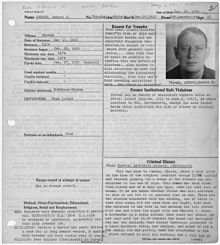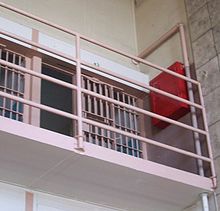- Robert Stroud
-
"Birdman of Alcatraz" redirects here. For the 1962 film, see Birdman of Alcatraz (film).
Robert Franklin Stroud 
Robert Stroud's mugshot from 1951Born January 28, 1890
Seattle, Washington, United StatesDied November 21, 1963 (aged 73)
Springfield, Missouri, United StatesAlias(es) The Birdman of Alcatraz Charge(s) manslaughter, 1909; assault, 1912; murder, 1916 Penalty Manslaughter – 12 years imprisonment; Assault – 6 months imprisonment; Murder – Death, commuted to life imprisonment Status Deceased Parents Benjamin Stroud
Elizabeth StroudRobert Franklin Stroud (January 28, 1890 – November 21, 1963), known as the "Birdman of Alcatraz", was a federal American prisoner who reared and sold birds and became an ornithologist. Despite his nickname, he actually only kept birds at Leavenworth penitentiary, prior to being transferred to Alcatraz, where he was not allowed to keep pets.
Contents
Arrest, trial and imprisonment
Stroud was born in Seattle, the eldest child of Ann Elizabeth and Benjamin Franklin Stroud, although his mother had two daughters from a previous marriage. His father was an abusive alcoholic and Stroud ran away from home at the age of 13. By the time he was 18, Stroud had made his way to Cordova, Alaska, where he met 36 year old Kitty O’Brien, a prostitute and dance-hall entertainer, in Cordova, Alaska. They moved to Juneau where Stroud acted as her pimp.
According to Stroud, on January 18, 1909, while he was away at work, an acquaintance of theirs, barman F. K. "Charlie" Von Dahmer, viciously raped and beat O'Brien. After finding out about the incident that night, Stroud confronted Von Dahmer and a struggle ensued, resulting in the latter's death from a gunshot wound. Stroud went to the police station and turned himself and the gun in. However, according to police reports, Von Dahmer failed to pay O'Brien, and after Stroud had knocked Von Dahmer unconscious, he then shot him at point blank range, then took his wallet to ensure that he would receive payment for O'Brien's services.
Stroud's mother Elizabeth retained a lawyer for her son, but he was found guilty of manslaughter on August 23, 1909 and sentenced to 12 years in the federal penitentiary on Puget Sound's McNeil Island. Stroud's crime was handled in the Federal system, as Alaska at that time was still a Federal territory, and not a state with its own judiciary.
Prison life
Known as Prisoner #1853-M, Stroud was one of the most violent prisoners at McNeil Island. He assaulted a hospital orderly who had reported him to the administration for attempting to obtain morphine through threats and intimidation, and also reportedly stabbed a fellow inmate who was involved in the attempt to smuggle the narcotics. On September 5, 1912, Stroud was sentenced to an additional six months for the attacks and transferred from McNeil Island to the federal penitentiary in Leavenworth, Kansas. On March 26, 1916; Stroud was reprimanded by a guard in the cafeteria, Andrew F. Turner, for a minor rule violation. Although the infraction was not a serious one, it could have annulled Stroud's visitation privilege to meet his younger brother, whom he had not seen in eight years. Stroud flew into a rage, and stabbed Turner to death.
 Stroud's mug shot and information in the warden's notebook
Stroud's mug shot and information in the warden's notebook
He was convicted of murder and sentenced to execution by hanging on May 27, and was ordered to await his death sentence in solitary confinement. The sentence was thrown out in December by the U.S. Supreme Court, because the jury had not said that it intended for Stroud to hang. In a second trial held in May 1917, he was also convicted, but received a life sentence. That sentence was also thrown out by the Supreme Court on constitutional grounds. Stroud was tried a third time starting in May 1918, and on June 28 he was again sentenced to death by hanging. The Supreme Court intervened, but only to uphold the death sentence, which was scheduled to be carried out on April 23, 1920.
At this point Stroud's mother appealed to President Woodrow Wilson and his wife, Edith Bolling Wilson, and the execution was halted.[1] Stroud's sentence was again commuted to life imprisonment. Leavenworth's warden, T. W. Morgan, strongly opposed the decision to let Stroud live, given his reputation for violence. He persuaded Wilson to stipulate that since Stroud was originally sentenced to await his death sentence in solitary confinement, those conditions should prevail until the halted execution should be carried out. In effect, this sentenced Stroud to a lifetime in segregation, with no employment and no contact with other inmates.
Stroud was transferred to Alcatraz on December 19, 1942, where he spent six years in segregation and another 11 confined to the hospital wing. In 1959 Stroud was transferred to the Medical Center for Federal Prisoners in Springfield, Missouri, where he stayed until his death in 1963.
In 1963 Richard M. English, a young lawyer who had campaigned for John F. Kennedy in California, took to the cause of securing Stroud's release. He met with former President Harry Truman to enlist support, but Truman declined. He also met with senior Kennedy administration officials who were studying the subject.
English also took the last photo of Stroud, in which he is shown with a green visor. The warden of the prison attempted to have English prosecuted for bringing something into the prison he did not take out, namely unexposed film. The authorities declined to take any action.
Upon Stroud's death his personal property, including original manuscripts, was delivered to English, as his last attorney representative. English later turned over some of the possessions to the Audubon Society.
The Birdman of Leavenworth
While at Leavenworth, Stroud found a nest of injured sparrows in the prison yard and raised them to adulthood. Prisoners were sometimes allowed to buy canaries, and by the early 1920s Stroud had several. He started to occupy his time raising and caring for his birds, which he could sell for supplies and to help support his mother. Soon thereafter, Leavenworth’s administration changed and the prison was then directed by a new warden. Impressed with the possibility of presenting Leavenworth as a progressive rehabilitation penitentiary, the new warden furnished Stroud with cages, chemicals, and stationery to conduct his ornithological activities. Visitors were shown Stroud's aviary and many purchased his canaries. Over the years, he raised nearly 300 canaries in his cells and wrote two books, Diseases of Canaries, and a later edition, Stroud's Digest on the Diseases of Birds, with updated specific information. He made several important contributions to avian pathology, most notably a cure for the hemorrhagic septicemia family of diseases. He gained respect and also some level of sympathy in the bird-loving field.
Soon Stroud’s activities created problems for the prison management. According to regulations, each letter sent or received at the prison had to be read, copied and approved. Stroud was so involved in his business that this alone required a full-time prison secretary. Additionally, most of the time his birds were permitted to fly freely within his cells. Due to the great number of birds he kept, his cell was dirty and Stroud’s personal hygiene was reported to be gruesome. In 1931, an attempt to force Stroud to discontinue his business and get rid of his birds failed after Stroud and one of his mail correspondents, a bird researcher from Indiana named Della Mae Jones, made his story known to newspapers and magazines and undertook a massive letter- and petition-writing campaign that climaxed in a 50,000-signature petition being sent to the President. The public complaints resulted in Stroud being permitted to keep his birds — despite massive prison overcrowding he was even given a second cell to house them — but his letter-writing privileges were greatly curtailed. Jones and Stroud grew so close that she moved to Kansas in 1931 and started a business with him, selling his medicines.
In 1933, Stroud advertised in a publication to publicize the fact that he had not received any royalties from the sales of Diseases of Canaries. In retaliation, the publisher complained to the warden and, as a result, proceedings were initiated to transfer Stroud to Alcatraz, where he would not be permitted to keep his birds. Stroud, however, discovered a Kansas law that forbade the transfer of prisoners married in Kansas. He then married Jones by proxy, which infuriated prison officials, who would not allow him to correspond with his wife.
Stroud was able to keep his birds and his canary-selling business until it was discovered, several years later, that some of the equipment Stroud had requested for his lab was in fact being used as a home-made still to distill alcohol.
Prison officials were not the only ones unhappy with Stroud's marriage; his mother was also incensed. They had a close relationship, but Elizabeth Stroud strongly disapproved of the relationship, believing women were nothing but trouble for her son. Whereas previously she had been a strong advocate for her son, helping him with legal battles, she now argued against her son's application for parole, and became a major obstacle in his attempts to be released from the prison system. She moved away from Leavenworth and refused any further contact with him until her death in 1937.
Alcatraz
Stroud was transferred to Alcatraz on December 19, 1942. While there, he wrote two manuscripts: Bobbie, an autobiography, and Looking Outward: A History of the U.S. Prison System from Colonial Times to the Formation of the Bureau of Prisons. A judge ruled that Stroud had the right to write and keep such manuscripts, but upheld the warden’s decision of banning publication. After Stroud's death the transcripts were delivered to his last attorney, Richard M. English of California.
In 1943, he was assessed by psychiatrist Romney M. Ritchey, who diagnosed him as a psychopath, with an I.Q. of 134.
Stroud spent six years in segregation and another 11 confined to the hospital wing. He was allowed access to the prison library and began studying law. Stroud began petitioning the government that his long prison term amounted to cruel and unusual punishment. In 1959, with his health failing, Stroud was transferred to the Medical Center for Federal Prisoners in Springfield, Missouri. However, his attempts to be released were unsuccessful. On November 21, 1963, the day before the assassination of President John F. Kennedy, Robert Franklin Stroud died at the Springfield Medical Center at the age of 73, having been incarcerated for the last 54 years of his life, of which 42 were in solitary confinement. He had been studying French near the end of his life.
Robert Stroud is buried in Metropolis, Illinois (Massac County). [2]
Biography and popular culture
Stroud became the subject of a 1955 book by Thomas E. Gaddis, Birdman of Alcatraz , which was adapted in 1962 into a film by Guy Trosper. It was directed by John Frankenheimer and starred Burt Lancaster as Stroud, Karl Malden as a fictionalized and renamed warden, and Thelma Ritter as Stroud's mother. Stroud was never allowed to see the film.
Dennis Farina played Stroud in the 1987 TV movie Six Against the Rock, a dramatization of the Battle of Alcatraz of 1946.[3]
He was also the (musical) subject of the instrumental "Birdman of Alcatraz" from Rick Wakeman's Criminal Record, a concept album about criminality.
In the manga and anime Katekyo Hitman Reborn!, a character named Birds, an escaped mafia hitman who uses birds, is based on Robert Stroud.[citation needed]
In the satirical publication MAD Magazine, in a comic-strip presentation mocking Alfred Hitchcock's The Birds (entitled "For The Birds"), the bird attacks on humans, left unexplained in the film, are shown to be orchestrated by Robert Stroud.
In the cartoon Superjail!, the character Gary is an allusion to Robert Stroud, who always appears with a small yellow bird on his shoulder.
It is mentioned briefly in the "Cat Orgy" episode of the animated series South Park when Shelly refers Eric Cartman as the "Turdman of Alcatraz".
References
- ^ article on Robert Stroud by website of Time magazine
- ^ "Robert Stroud". Find A Grave. 2001-01-01. http://www.findagrave.com/cgi-bin/fg.cgi?page=gr&GRid=996. Retrieved 2007-02-12.
- ^ Six Against the Rock at MovieTome.com
External links
Categories:- 1890 births
- 1963 deaths
- Alcatraz inmates
- American memoirists
- American ornithologists
- American ornithological writers
- American people convicted of manslaughter
- American people who died in prison custody
- American prisoners sentenced to death
- American prisoners sentenced to life imprisonment
- American people convicted of assault
- People from Seattle, Washington
- Prisoners sentenced to life imprisonment by the United States federal government
- Prisoners who died in United States federal government detention
Wikimedia Foundation. 2010.

